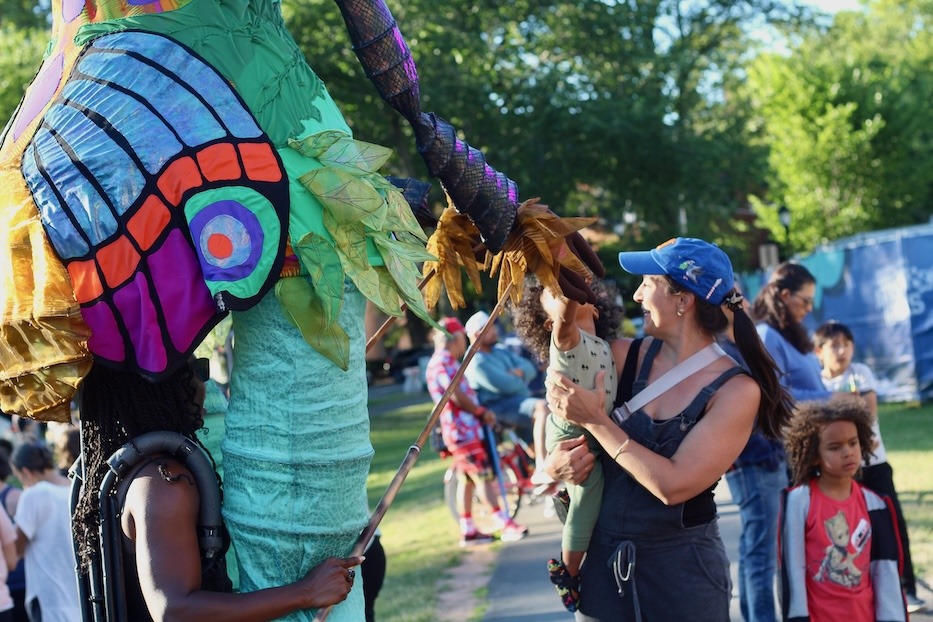
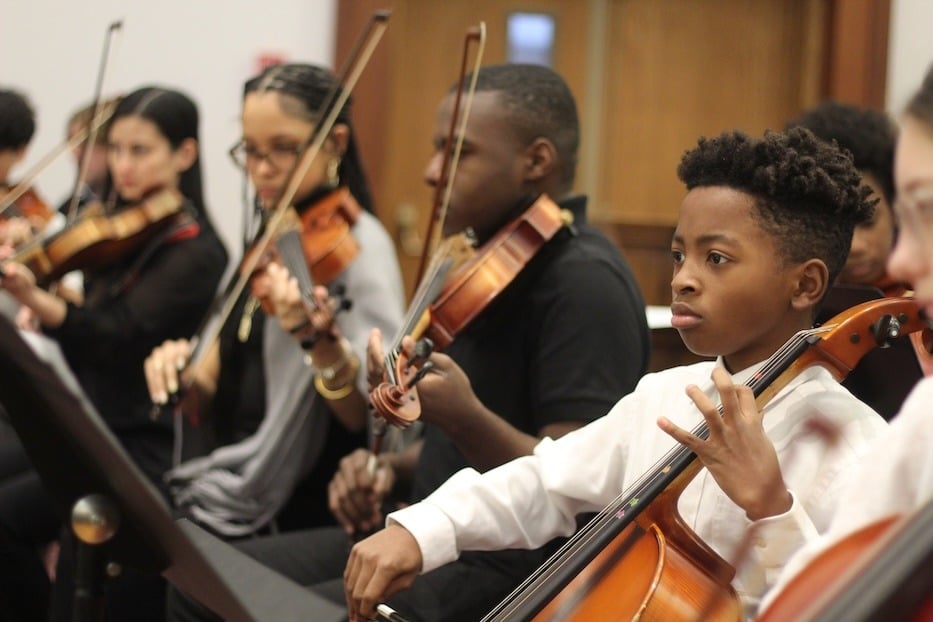 Top: Anne Cubberly's Giant Puppets at the 2024 International Festival of Arts & Ideas, which lost $65,000 of NEA grant funding. Bottom: Young cellist Amiel "AJ" Johnson, a sixth grader at Nathan Hale School and a student at Music Haven. Lucy Gellman File Photos.
Top: Anne Cubberly's Giant Puppets at the 2024 International Festival of Arts & Ideas, which lost $65,000 of NEA grant funding. Bottom: Young cellist Amiel "AJ" Johnson, a sixth grader at Nathan Hale School and a student at Music Haven. Lucy Gellman File Photos.
A fledgling collaborative dedicated to arts learning across the state. An exhibition of Indonesian textiles spanning centuries of craft. Direct support for teaching artists and after-school homework help for the students they work with. A production of Zora Neale Hurston’s Spunk that will open in October. An all-Black circus troupe set to arrive in New Haven next month.
Those are just some of the programs impacted by sweeping cuts to the National Endowment for the Arts (NEA), which last Friday notified thousands of grantees—including several in the greater New Haven region—that their current funding had been terminated. In close to a dozen phone calls Tuesday and Wednesday, area nonprofit leaders confirmed that the terminations included grants for both the 2024 and 2025 fiscal years.
Organizations impacted include Long Wharf Theatre, Music Haven, the International Festival of Arts & Ideas, Yale Repertory Theatre, Yale University Art Gallery, Yale University, Arts for Learning Connecticut, Music Haven, Project Music Heals Us, Inc., and Connecticut Arts Administrators Association Incorporated.
NXTHVN, which last year received $15,000 and this year received $40,000 to support its fellowship program, would not confirm that it had received notice of grant termination.
Together, the funding symbolizes over $400,000 that would have been distributed to New Haven organizations this year. The notices of termination, sent from an unmonitored NEA email address, came just hours after President Donald Trump released a budget that proposes eliminating the NEA and the Institute of Museum and Library Services in their entirety. Organizations have seven days (from last Friday) to appeal the decision.
The NEA has not released a full list of terminated grants. In the meantime, organizations have begun crowdsourcing that information, with a document to which artists and nonprofits can add information. In New Haven, it comes as United Illuminating also announces the cessation of its Lighting Up The Arts grant program, which last year awarded $75,000 to 19 arts organizations in the area.
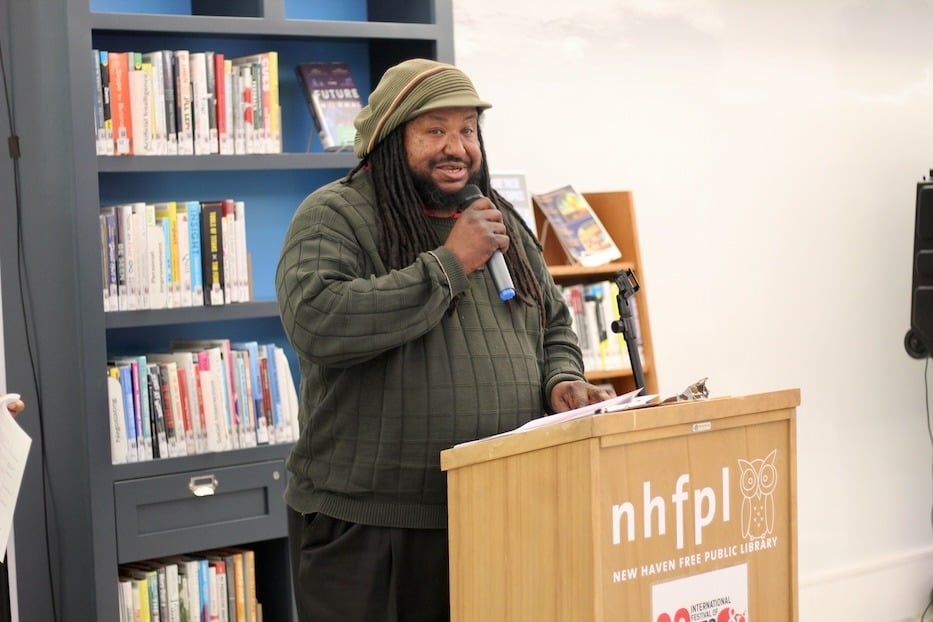
Ewing at a launch party for the International Festival of Arts & Ideas last month. Lucy Gellman Photo.
“We’re angry!” said Kevin “RevKev” Ewing, interim director at the International Festival of Arts & Ideas, who learned over the weekend that the festival had lost $65,000 in grant funding. “It makes absolutely no sense. Basically, you’re telling me that I cannot trust my government to keep their word. We’re still gonna have a festival, and they’re not gonna stop us, and it’s gonna be wonderful.”
But, he and others added, it means that arts funding, and the programming that it supports, just became harder to come by. At the Festival—which has already rolled forward without funding that normally supports its citywide “Big Read”—the NEA’s $65,000 was slated to support 2025 summer programming, including performances from Minty Fresh Circus, A Broken Umbrella Theatre Company, and Squonk Opera.
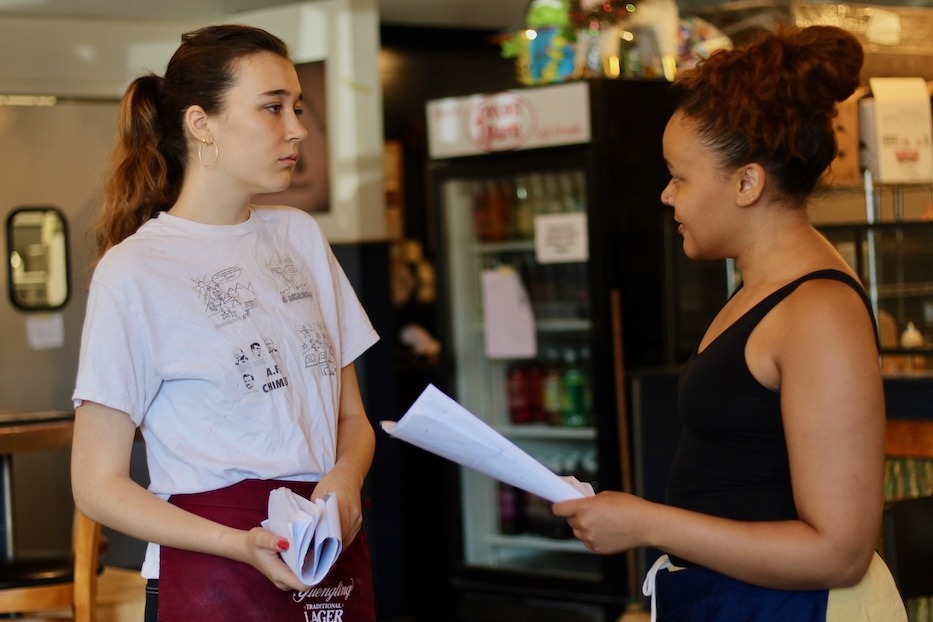
Alice McGill and Remsen Welsh in A Broken Umbrella Theatre Company's A Slice, a full version of which will premiere this year at the International Festival of Arts & Ideas.
That programming will continue next month as planned, Ewing said—but the Festival isn’t sure where that $65,000 will come from. “This was funding that we were approved for, built our budget around, and expected to be paid,” he said in a statement on social media. “While we are appealing this decision, there is widespread uncertainty around these funding cuts.”
In the midst of the Community Foundation for Greater New Haven’s annual Great Give, he added an urgent appeal, asking individuals to donate if they have the resources to do so. The Festival will go on as planned, he said in Wednesday's call—but its survival will depend on the community in ways that staff could not have anticipated a year ago.
“We will continue to exist and resist as a community. We will see you in our Neighborhoods, on The Green, and all over New Haven in the coming months,” he wrote. “We will have a Festival. And we can’t do it without you.”
As news of cancelled grants rippled through New Haven Tuesday and Wednesday, organizations began to speak publicly about the impact and scale of the loss. Eric Gershman, interim managing director at Long Wharf Theatre, confirmed that the theater had lost over $170,000 in NEA funding, including a $150,000 grant for “Pass the Mic,” a collaboration with community groups like the The Elements of Abundance (a.k.a. Arden Santana and Hafeeza Turé) “to build trust and foster healing among communities of color.”

Actors in Long Wharf Theatre's She Loves Me last year at The LAB at ConnCORP. Curtis Brown Photography.
“This funding was meant to support community-centered work across New Haven, from classrooms to cafes,” Gershman said in a statement Wednesday morning that Long Wharf later posted to its social media channels. “Its loss will have a real and immediate impact on the programming we’re able to offer and the people we can reach.”
Avery Anderson, marketing and communications consultant for the theater, added that Long Wharf is “actively preparing” its appeal to the NEA.
Around the city and the region, other nonprofits were left reeling by not only the news, but its inevitable and still-evolving aftershocks. Many of the grants provided vital support for projects in the very near future, from $30,000 for Nusantara: Six Centuries of Indonesian Textiles at the Yale University Art Gallery (opening in September of this year) to a production of Zora Neale Hurston’s Spunk set to open at the Yale Repertory Theatre in October.
“Our commitment to producing the play is unwavering,” wrote James Bundy, Elizabeth Parker Ware Dean of David Geffen School of Drama at Yale and Artistic Director of Yale Repertory Theatre, in a message to faculty, staff and students earlier this week. “Moreover, we stand in solidarity with hundreds of other defunded theaters whose joyful artistry is essential to civic life and civil discourse.”
Bundy also pointed to the dissonance that many artists, arts champions, and arts leaders are feeling (and that some have publicly pointed out) at this moment. The NEA represents just .0003 percent of the federal budget. Its return on investment—the money it puts into the U.S. economy, including right here in Connecticut—is $1.2 trillion.
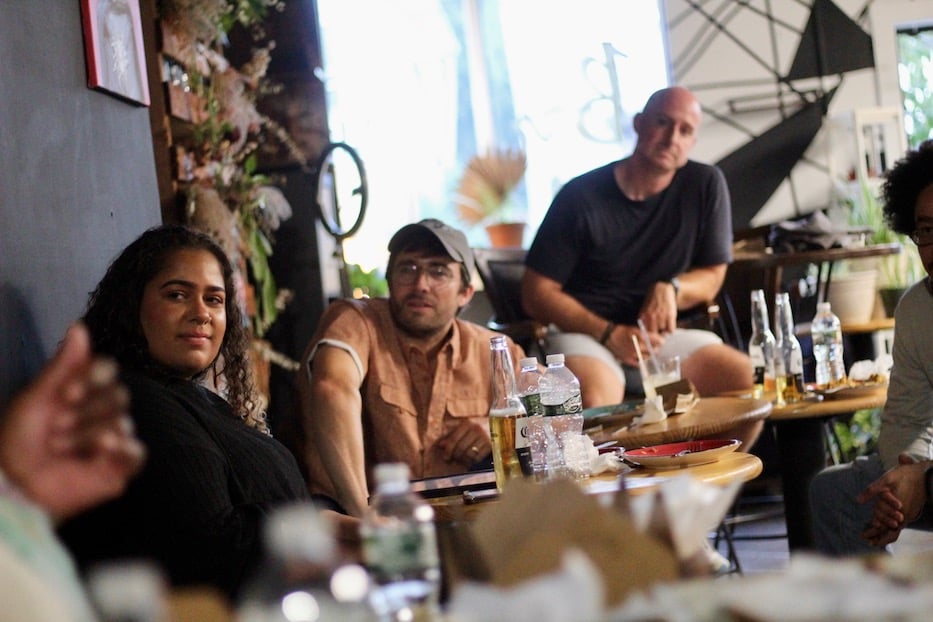
Teaching artists from AFLCT at a gathering at Madeline's Empanaderia in 2023. Lucy Gellman File Photo.
John-Michael Parker, executive director of Arts for Learning Connecticut (AFLCT), also stressed how wide-reaching the impacts of the cuts may be. On Friday evening, he received a notification that a $65,000 grant AFLCT received last year was among those that had been terminated. While that funding supported AFLCT’s Higher Order Thinking (HOT) Schools, he’s also concerned about a 2025 $50,000 grant on which the organization is a partner.
That grant, awarded to Connecticut Arts Administrators Association Incorporated (CAAA) earlier this year, was to pilot something called the Connecticut Arts Learning Collaborative (CALC), a partnership between the CAAA, Connecticut State Department of Education,Connecticut Office of the Arts, and AFLCT.
“The goal of the initiative is to ensure high-quality, equitable arts learning for all students across the state,” read the initial description of the project. Now, planning for the initiative itself—like funding for a project consultant—feels precarious.
“This was the seed funding to launch the project,” Parker said in a phone call Wednesday afternoon. While the collaborative is appealing the decision, the launch of the program itself now feels uncertain and precarious. “We have tried to explain that this could support every student across the state.”
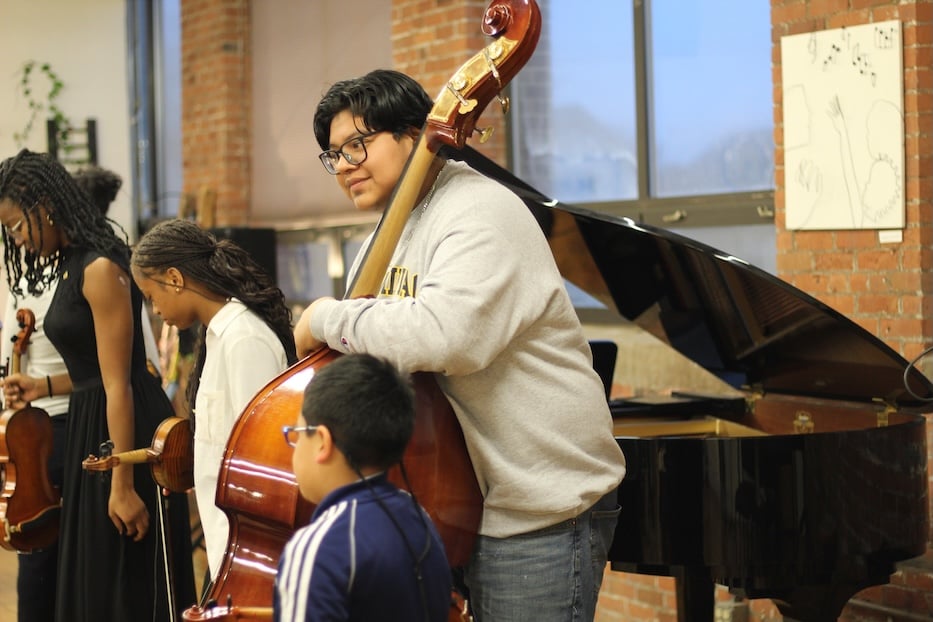
Abraham Perez Orozco, a senior at Career Regional High School who has been studying the cello at Music Haven for the last several years.
As she prepared for a senior recital Wednesday afternoon, Music Haven Executive Director Milda Torres McClain echoed that disappointment. Last year, Music Haven received a $25,000 grant from the NEA to support its programming. That funding—which the organization had the sense to fully retrieve from the NEA before this month—goes toward tuition-free music lessons, homework help, college preparedness, and after-school programming for the dozens of kids that it serves.
But a grant that the organization put in to the NEA for the next fiscal year? That's in federal funding limbo. And McClain, like others, knows that as federal funding disappears, the pool for foundation and individual giving will inevitably become tighter and more selective.
“It just makes it much more difficult,” she said, noting that many of Music Haven’s students also rely on programs like Title I and emergency food service providers, which are also affected by the current administration. “We’re an organization that families really depend on, not just because of our music but because of the wraparound services that we provide to students. All of our programs are going to be affected, and there’s such great need in the community.”
“It was really unfortunate at the end of a long week,” added Bridget Budish, executive director of the Guilford-based Project Music Heals Us, Inc.. (PMHU), in a phone call Wednesday afternoon. “It’s just a bit of whiplash.”
Earlier this year, the organization—which was incorporated in Guilford, but now works nationally and internationally—received $35,000 for its “Together We Climb” project, work on which began in January. Inspired by Amanda Gorman’s poem “The Hill We Climb,”, the project brings PMHU facilitators into carceral facilities, to co-create poetry, writing, music and artwork based on the poem. Eventually, the organization hoped to tour with the works.
But since Friday, it’s been a scramble to figure out how the project can work without half of its funding. “It just makes it hard to plan and it just gives us this sense of uncertainty,” Budish said.
It comes at a moment when state funding also remains precarious. Earlier this year, Connecticut Gov. Ned Lamont proposed a $2 million cut to the state’s Arts, Culture and Tourism budget, including cuts to line item funding that have since been restored.
Meanwhile, the Connecticut Office of the Arts (CoA) relies heavily on federal funding. Currently, CoA receives $1,497,298 in discretionary spending from the State of Connecticut, as well as roughly $850,000 in interest from the Connecticut Arts Endowment. The other $1,026,100—roughly half of the office’s budget—comes from the National Endowment for the Arts. That money goes to statewide grants and covers one staff salary.
“There are a lot of unknowns right now,” said Director of Arts, Preservation and Museums Elizabeth Shapiro in an interview earlier this year. During that same conversation, she acknowledged that sustained cuts to NEA funding—or the NEA itself—will almost certainly impact CoA funding, from staffing capabilities to who and what it is able to fund in the state.
"While recent grant terminations affect direct federal grantees, the Connecticut Office of the Arts is encouraged that, in accordance with congressional mandate, State Arts Agency Partnership Agreements remain intact," Shapiro added in a statement Friday. "The federal-state partnership continues to provide vital support to underserved, rural, and economically challenged communities across Connecticut.